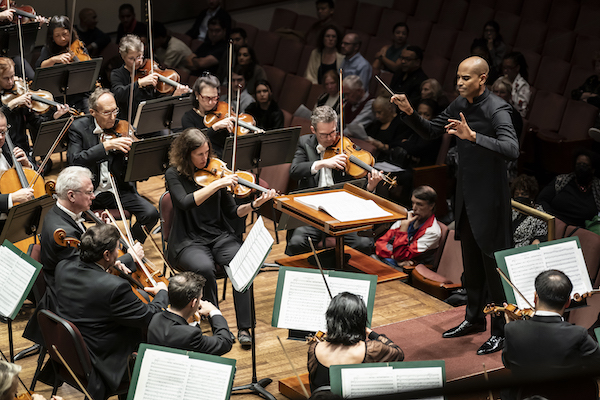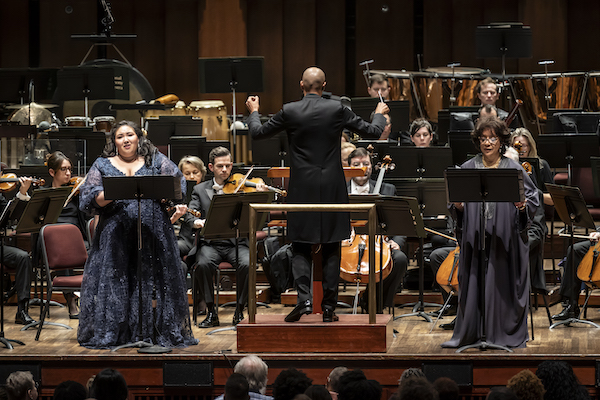Edusei deftly leads National Symphony in a refreshingly national program

Kevin John Edusei conducted the National Symphony Orchestra in music of Ellington, Hailstork and Adams Thursday night at the Kennedy Center. Photo: Scott Suchman
The National Symphony Orchestra lived up to its name this week, with an all-American program of music written since 1950. While the potential dissonance implied by that description may have kept the Kennedy Center Concert Hall far less than full Thursday night, listeners need not have worried. The three pieces led by Kevin John Edusei, principal guest conductor of the Fort Worth Symphony Orchestra, were anything but thorny and forbidding.
Arturo Toscanini and the NBC Symphony Orchestra commissioned the concert opener, Harlem, from Washington’s favorite son, Duke Ellington, in 1950. The eminent jazz composer conceived this concert work as an orchestral tour of the sounds of his adopted New York neighborhood. The opening gesture, a wah-wah minor 3rd bending down in the plunger-stopped trumpet, called out “Harlem!,” as if on a street corner.
Luther Henderson’s large orchestration glittered with big band power in blaring brass and five saxophones. After the opening bluesy section, Ellington led us toward Spanish Harlem in a “Fast Rhumba,” where there was a brash solo from Dana Booher on baritone sax. Among the many guest musicians who took the stage for the piece was Joshua Kauffman, of the U.S. Army Blues band, on the sizzling high trumpet solos.
More sax solos punctuated the other slow section, depicting the music of a Harlem funeral, followed by a slightly lackluster percussion break leading to the conclusion. Throughout the piece, several influences on Leonard Bernstein—who would compose the score for West Side Story in the same decade—became apparent. Edusei, a German conductor who last conducted the NSO earlier this year, led this work with easy charm.
The NSO co-commissioned a new work from Adolphus Hailstork, an alumnus of Howard University, to mark the 60th anniversary of President John F. Kennedy’s speech at Amherst College marking the passing of Robert Frost. JFK: The Last Speech had its world premiere last July at the Colorado Music Festival in Boulder, but the NSO’s first performance of the work fell on the precise anniversary of the speech, October 26, 1963.
Commemorative commissions of this sort are generally terrible, performed once and hopefully shelved forever, famously flummoxing even accomplished composers, from Aaron Copland and Leonard Bernstein to Peter Lieberson. Hailstork fell into some of the same traps, including having a part for a speaker, who read Kennedy’s speech, with the pronouns changed to be more inclusive. Actress Phylicia Rashad, who is currently dean of the Chadwick A. Boseman College of Fine Arts at Howard University, intoned the president’s words with consummate dignity.

Soprano Katerina Burton (left) and speaker Phylicia Rashad were soloists in Adolphus Hailstork’s JFK: The Last Speech. Photo: Scott Suchman
The other parts of Neil Bicknell’s misty libretto, which incorporated a few lines by Frost, were given to the luminous soprano Katerina Burton. Her voice was so limpid and cushioned that the sparse accompaniment she received, often just the harp, revealed nothing but the beauty of her tone. Linking together the alternation of sung and spoken lines were orchestral sections largely in the style of Copland, down to the sound of pentatonic Americana.
The piece was attractively elegiac and nostalgic, but too much of it sounded the same with little variety. Some lush strings and soaring brass came out toward the end, as Rashad read the words about the value of the arts in a free society, lines inscribed in large gold letters on the outside wall of the Kennedy Center, facing the Potomac River.
The loudest sounds of the evening came after intermission, when the stage overflowed with the vast instrumentation called for in John Adams’ Harmonielehre, from 1985. Adams named the work in honor, or perhaps dishonor, of Arnold Schoenberg. The score represented an American composer’s embrace of tonal harmony, at a time when “the audience for classical music during the twentieth century was rapidly shrinking, in no small part because of the aural ugliness of so much of the new work being written,” as Adams wrote.
Last heard from the NSO in 2007, under Leonard Slatkin, this massive work gave the orchestra a sweat-inducing workout. Edusei conducted the three movements in patterns that clarified the complex overlap of polyrhythms, especially in the bustling outer movements. The piece really opened up in the gentler middle section of the first movement, with a yearning romantic theme begun by the cellos. The amassing of wild sonorities, made possible with two tubas, three piccolos, two bass clarinets, and so on, reached a crazed climax.
The second movement (“The Anfortas Wound”) opened with basses divided in four parts, accompanied by murky low winds and timpani. The lush chromatic harmony of this movement felt reminiscent of the Ellington piece that had opened the concert, culminating in massive dissonant chords like the tonality-shattering “Gate of Hell” chord in Mahler’s Tenth Symphony.
In the third movement (“Meister Eckhardt and Quackie”), Edusei helped the NSO craft a slow, steady burn of bubbling activity, the crowning piece of an excellent outing at the podium. Doppler-effect swells of brass signaled the final drive to an ear-piercing conclusion, in full-throated E-flat major, growing to a cataclysmic dynamic marking of fffff.
The program will be repeated 8 p.m. Saturday. kennedy-center.org
